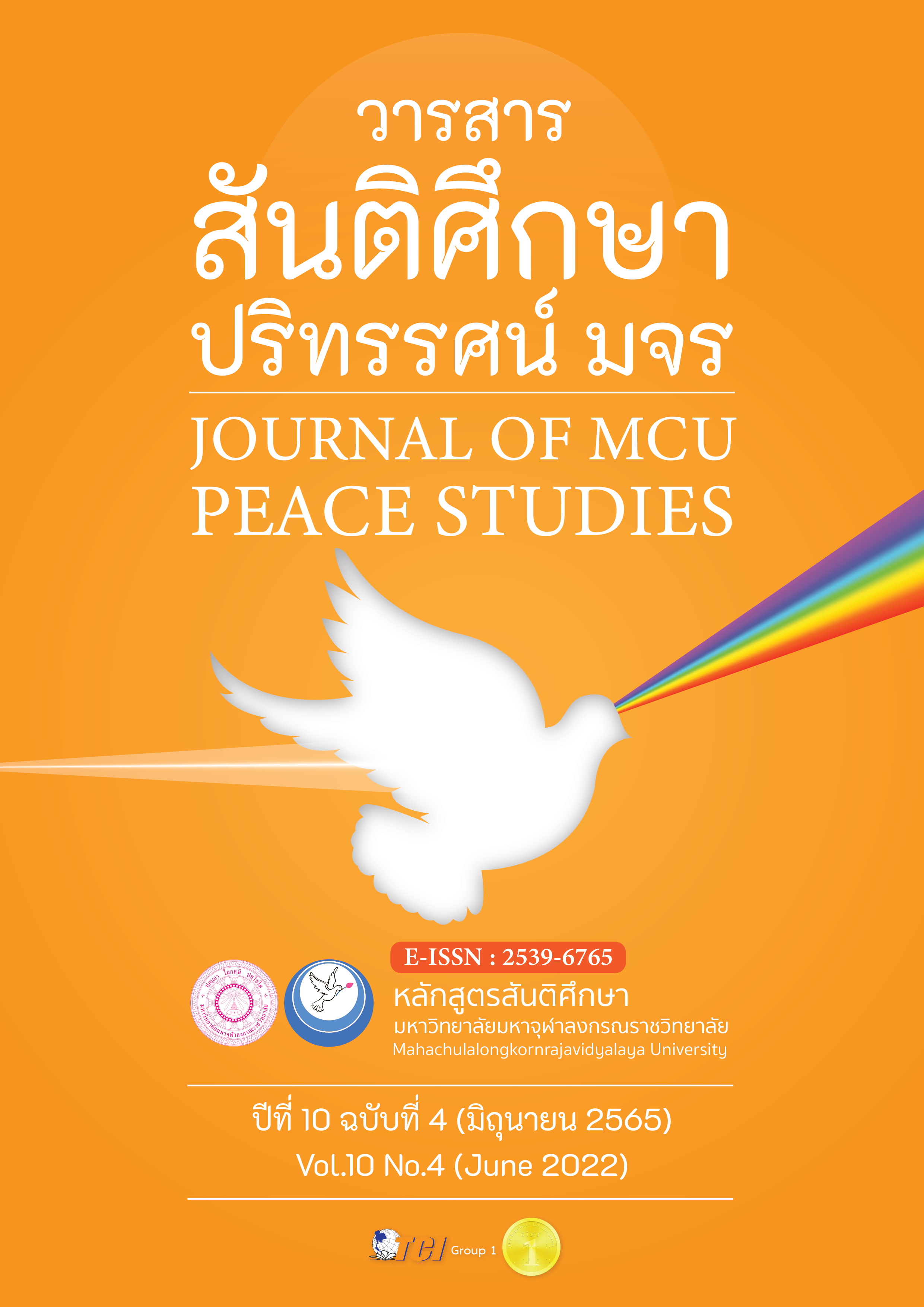An Integrative Process for Oral health care by Buddhist Mindfulness and Oral Health Science
Main Article Content
บทคัดย่อ
The objectives of this research are: 1. To examine problems and methods of oral health care according to oral health science, 2. To analyze the concept of oral health care in Buddhist scriptures, 3. To present an integrative process for oral health care by Buddhist mindfulness and oral health science. The data were collected from reference documents and seven key informants for in-depth interviews. The Item-Objective Congruence (IOC) form was examined by three experts and the focus group discussion (FGD) was held by five experts to approve the analysis of the integrative oral health care process with Buddhist mindfulness.
The findings of this research are as follows: 1) many people all over the world suffer from the most common oral problems caused by their behavioral and mental aspects. According to oral health science, dental plaque is the key etiological factor of tooth and gum diseases. 2) According to Tipiṭaka, the Buddha had taught about oral hygiene for a few cases. Brushing methods in the Buddha’s time was related to the methods of dental care that appeared in the Ayurveda with the same purposes of making teeth clean and preventing from bad breath. The concept of integrative process for oral health care is applying the practice of Buddhist mindfulness into the way of taking care of oral health in order to achieve the completeness of oral hygiene for perfect functioning affecting holistic well-being. 3) The integrative process for oral health care comprises prevention and providing care. The process of prevention refers to right methods for oral health care including mindful tooth brushingmindful flossing and tongue cleaning as well as practicing right speech and basic Buddhist practices (Dāna, Silā and Samādhi). The process of providing care has three points: (1) Visiting the dentist for finding out the exact causes of oral pathology and learning how to do the good oral hygiene applied with Buddhist mindfulness and self-awareness (Sati-Sampajañña), (2) Speaking truthfully, politely, honestly with goodwill to help the listeners get something beneficial and abstaining from delivering bad speech (Sammāvācā), and (3) Purifying the mind by tranquil meditation to promote mental well-being (Sammāsamādhi).
Article Details

อนุญาตภายใต้เงื่อนไข Creative Commons Attribution-NonCommercial-NoDerivatives 4.0 International License.
ทัศนะและความคิดเห็นที่ปรากฏในบทความในวารสาร ถือเป็นความรับผิดชอบของผู้เขียนบทความนั้น และไม่ถือเป็นทัศนะและความรับผิดชอบของกองบรรณาธิการ ยินยอมว่าบทความเป็นลิขสิทธิ์ของวารสาร
เอกสารอ้างอิง
Albabtain, R., Ibrahim L., Bhangra S., Rosengren A., Gustafsson A. (2018). Chemical effects of chewing sticks made of Salvadora persica, International Journal of Dental Hygiene, 16 (4), 535-554.
Bannaruji. B. (2021). Fellow of the Royal Society of Thailand. Focus Group. November, 25.
Burlingame, Eugene Watson (trans.). (2009). Eugene Watson Burlingame (tr.), Buddhist Legends part 3 (Dhammapada Commentary. Oxford: Pali Text Society.
Centers for Disease Control and Prevention (2019). Oral Health Surveillance Report: Trends in Dental Caries and Sealants, Tooth Retention, and Edentulism, United States, 1999–2004 to 2011–2016. Atlanta, GA.
Denise M. Bowen; Jennifer A. Pieren (2020). Dental hygiene: theory and practice. (5th ed.). Maryland Heights: Elsevier, Inc.
Davids T.W.and C.A.F. Rhys (trans.). (1910). Dialogues of the Buddha Translated from the Pali of the Dīgha Nikāya, Part II, Oxford: Pali Text Society.
Hare, E.M. (trans.). (1973). The Gradual Sayings (Anguttara-Nikāya) Vol. III (The Books of the Fives and Sixes). London: Pali Text Society.
Hornor, I. B. (trans.), (1963). The Book of the Discipline (Vinaya Pitaka). Vol. V (Cullavagga). London: Pali Text Society.
Masefield, Peter (trans.). (2000). The Itivuttaka. Oxford: Pali Text Society.
Norman, K. R. (1997). The Word of the Doctrine (Dhammapada). Oxford: Pali Text Society.
Oldenberg, Hermann (ed.). (1995). The Vinaya Piṭakaṃ. The Sutavibhañge. Oxford: Pali Text Society
Phradhamvajrabundit (Somjin Sammapanyo). (2021). Rector of Mahachulalongkornrajavidyalaya University. Interview. August 17.
Sanu Mahatthanadull & Sarita Mahatthanadull. (2016). Holistic Well-being Promotion for Balanced Way of Life according to Buddhist Psychology. (Research Report). Ayutthaya: Buddhist Research Institute of MCU.
Yotnuengnit P. (2021). Special Lecturer & Clinical Instructor of Department of Oral Medicine and Periodontology, Faculty of Dentistry, Mahidol University. Interview. August, 1.


